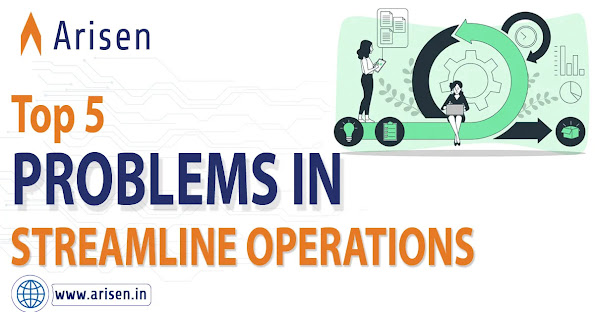Companies today are constantly trying to change, which is excellent, but it does negatively impact how they operate. Each corporation employs a number of business procedures on a regular basis; many of these procedures may not be effective. So, it should go without saying that any organization’s main objective is to achieve overall operational efficiency, which is why streamline operations is so important.
There could be a lot of consequences if your organization is unable to streamline its procedures. Among these include inefficiencies, misunderstandings, more room for error, and bad governance. The requirement for a solution that can support you through the process and lay a foundation that can survive current changes and handle upcoming disruptions arises from the fact that streamlining operations is not without its challenges.
To-Increase has accepted this and developed a solution that, all in one, is embedded into Microsoft Dynamics 365 F&SCM. This solution helps align business roles, processes, flows, and technologies with your customer’s business goals.
This blog will go over the five main issues that people usually run into when attempting to simplify and improve their business operations, as well as how the correct BPM solution can be of assistance.
Need to Streamline Operations
Process simplification will aid in the elimination of duplicate and pointless tasks, improving and predicting business outcomes for enterprises. This reduces the possibility of mistakes and delays by continuously streamlining and streamlining your company processes. It further:
- Aids in locating bottlenecks that are generating delays or errors
- Enhances communication by bringing all stakeholders together on a single, centralized system
- Automating procedures and removing the need for manual labor or paperwork, proves to be more cost-effective.
- Makes it possible to spend resources and time effectively.
Analyzing current processes, implementing new procedures, improving current processes, and routinely reviewing and auditing documentation are all common steps in the streamlining process. Although modern technology and tool improvements have made streamlining a hassle-free, seamless process, achieving this is no simple undertaking.
5 Common Problems While Streamline Operations

There will be some common difficulties as you begin the process of simplifying, regardless of the size of the firm. But, being aware of them and being able to recognize them might help you navigate them successfully.
Here are the five typical issues that you will encounter as your company streamlines its operations:
Process Automation
There is a good chance that every firm has a number of monotonous, repetitive tasks that wear people out and waste time. There may be significant skill and time loss if these jobs are not discovered and a means to automate them is not found. Hence, we must identify the precise processes that require automation, set up the necessary infrastructure and tools, and adopt the best strategy. It would be wise to look for a solution at this point that may assist you in identifying and automating particular steps in various processes.
Language Barrier
Several businesses have offices spread throughout multiple nations in addition to numerous locations in the same region. When information needs to be shared internationally among teams or when teams or members need to understand their duties and responsibilities, the language and methods of communication might provide a barrier that hinders streamline operations in such situations. To accommodate geographically dispersed teams, you may need a unified method that enables you to publish the material in several languages.
Ease of Operations
In many cases, mobility might be the main barrier to simplified operations and, consequently, ease of operations. Because they are concerned about security and regulatory issues, many businesses are hesitant to enable mobility. Yet, some modern solutions make it simple for users to access the system from a mobile device if they have the skills necessary for the role. This increases the system’s operational simplicity.
Lack of Visibility
The duties and responsibilities of staff are frequently not fully understood, which causes operations to be inefficient. Operations can only be optimized when the employee’s position is linked to the corporate objectives as a whole. Hence, a system that allows us to get a full picture of every employee through a single point of contact can be useful for tracking employee objectives and duties. The security and compliance requirements must be carefully matched with the visibility needed.
Accesses to Best Practices
We are privileged to have access to the best knowledge today thanks to how far technology has advanced. There is simply too much information available nowadays. Which makes it challenging to find the best practices that are right for your business. By bridging knowledge gaps, empowering staff, and improving efficiency, sharing best practices can help organizations improve performance and productivity. The utilization of best practices that are successful in your business means that procedures can be streamlined through continuous process improvement.
How do you overcome these challenges?
The next logical question that arises after you have recognized the risks associated with simplifying operations in your company is, “How do we address this?”
Using a specialized BPM system can significantly improve business results and provide value. An all-encompassing BPM methodology, driven by goal-oriented objectives, can assist process automation and streamlining while also easing change. We have fantastic solutions for firms to do tasks in the manner they desire, in line with their general objectives. An integrated strategy gives you full access. Information gives you visibility into how organizational processes operate and enhances operations as a whole.
To-Increase is working to achieve this. As the world transitions to digital information, it is crucial for businesses to find the proper solution provider who can forge amazing synergies with business process management.
You might want to consider how business process management can help your company. We can help you run more efficiently before jumping on the bandwagon. We are available at any time for your guidance and to help you overcome the typical difficulties encountered. You can accelerate simplifying your processes and operations is a smart place to start.








